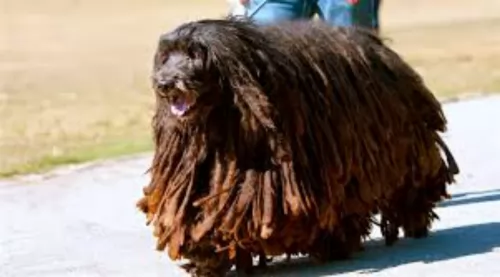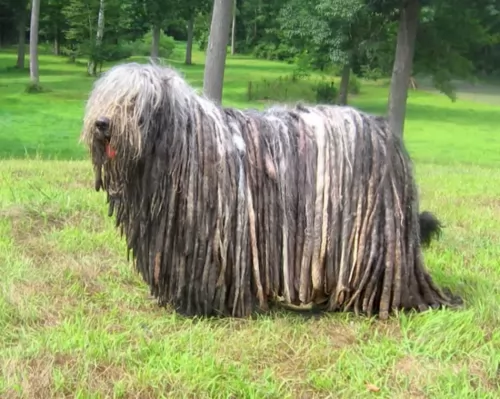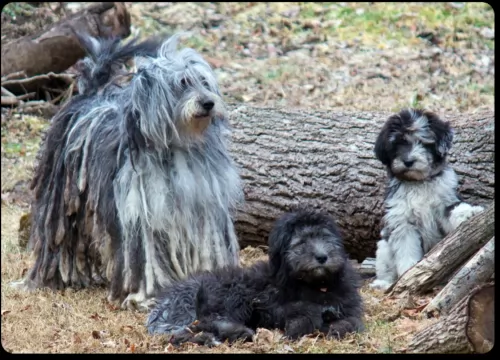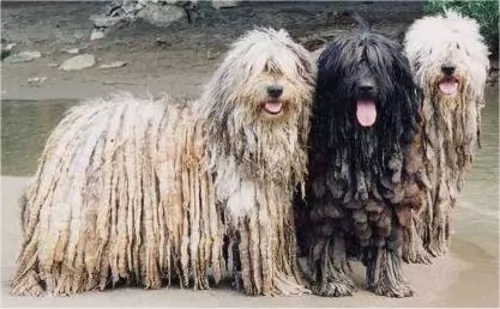 Petzlover
Petzlover Labrador Retriever is originated from Canada but Bergamasco is originated from Italy. Both Labrador Retriever and Bergamasco are of same height. Both Labrador Retriever and Bergamasco are having almost same weight. Both Labrador Retriever and Bergamasco has almost same life span. Both Labrador Retriever and Bergamasco has same litter size. Labrador Retriever requires Low Maintenance. But Bergamasco requires Moderate Maintenance
Labrador Retriever is originated from Canada but Bergamasco is originated from Italy. Both Labrador Retriever and Bergamasco are of same height. Both Labrador Retriever and Bergamasco are having almost same weight. Both Labrador Retriever and Bergamasco has almost same life span. Both Labrador Retriever and Bergamasco has same litter size. Labrador Retriever requires Low Maintenance. But Bergamasco requires Moderate Maintenance
 The Labrador Retriever has its origin from Newfoundland which is an island.Dorset Eskimos are the people who settled down first in Newfoundland. Newfoundland was discovered in 1494 by the Bristol traders from England. The people in the Newfoundland used Lab to help them during fishing.They were recognized as a kennel club breed in England.
The Labrador Retriever has its origin from Newfoundland which is an island.Dorset Eskimos are the people who settled down first in Newfoundland. Newfoundland was discovered in 1494 by the Bristol traders from England. The people in the Newfoundland used Lab to help them during fishing.They were recognized as a kennel club breed in England.
The Lab has its special talents in fishing, it nicely holds the fish in its mouth and swims well to bring it to the fisherman who was its master. They are also used to hunt game birds and waterfowl.
 The Bergamasco comes from northern Italy. This medium sized sheepdog is of ancient origin. Known as an Italian sheep herding breed, his name actually comes from the town where he comes from - Bergamo.
The Bergamasco comes from northern Italy. This medium sized sheepdog is of ancient origin. Known as an Italian sheep herding breed, his name actually comes from the town where he comes from - Bergamo.
It was after World War II that there was danger that this breed would disappear as the need for herding and shepherding was diminishing. An Italian breeder, however, Dr. Maria Andreoli, stepped in to save the breed.
It was in 2015 that the American Kennel Club also changed the breed’s status from Miscellaneous to the Herding Group.
 Lab is a nice companion and also it helps in doing several works if it is trained. Lab is the America's most popular breed. They help the hunters, works with police and also serves physically challenged people. They are very friendly and it helps people so much by doing many works. They have very good sensitivity and are so affectionate with family members.
Lab is a nice companion and also it helps in doing several works if it is trained. Lab is the America's most popular breed. They help the hunters, works with police and also serves physically challenged people. They are very friendly and it helps people so much by doing many works. They have very good sensitivity and are so affectionate with family members.
They have very high energy level in their young stage. The Lab is a muscular and athletic dog. They are sweet natured and well deserved. Lab needs physical and mental activities regularly as they are very intelligent and energetic. The pure bred Labs have black, chocolate and yellow colours. They are very interested in hunting and roaming. The young Lab should be given training to swim as a child, as they likes it very much. They takes more time to mature hence remaining as teenager for a long time when compared with other breeds.
 This medium sized sheepdog stands 54 – 62cm in height and weighs up to 38 kg as an adult. It is his coat which draws the most attention. It is of a coarse texture and actually greasy to the touch. It actually forms into strands or almost like dreadlocks from the top of the body, so that people agree he is one of shaggiest dog breeds there are.
This medium sized sheepdog stands 54 – 62cm in height and weighs up to 38 kg as an adult. It is his coat which draws the most attention. It is of a coarse texture and actually greasy to the touch. It actually forms into strands or almost like dreadlocks from the top of the body, so that people agree he is one of shaggiest dog breeds there are.
From age 1 on the coat starts to become woolly, and then the flocks start to form. As these clumps of hair appear, it will become necessary to separate them into smaller cords by hand to ensure attractive formation Brushing isn’t necessary but a big toothed comb can keep their hair ‘groomed’.
The colour of the coat is solid grey with patches of shades of grey and sometimes black. His dense, heavy coat makes it that he is suited to cooler climates. Because he is a herding dog, he wouldn’t do well in an apartment but would suit a home with a large garden.
He is intelligent and social but will need firm handling as he is a boisterous dog. He has a muscular yet compact body with a large head, long tail, high-set semi-drooping ears and large, gentle looking brown eyes. Although not instinctively aggressive, he makes an excellent watch dog with strong protective instincts to protect his human family.
He views new people into his circle with suspicion and wariness. He is good with kids and pets in the home and is playful and energetic.
 The Lab has a very good adaptability, it will get adjusted with its environment.
The Lab has a very good adaptability, it will get adjusted with its environment.
Lab has a good learning ability and it can learn upto 300 human phrases. They are the 7th most intelligent dog breed.
They are very much interested in playing with kids and are a very good companion for them.
 This is a working dog so they are naturally alert. He is also intelligent and independent and this independence is seen with training as he doesn’t take easily to following instructions, becoming stubborn. You’ll certainly want to have your Bergamasco socialized and trained as he can be a boisterous dog, bounding with energy.
This is a working dog so they are naturally alert. He is also intelligent and independent and this independence is seen with training as he doesn’t take easily to following instructions, becoming stubborn. You’ll certainly want to have your Bergamasco socialized and trained as he can be a boisterous dog, bounding with energy.
This is a dog that will need to be kept busy and provided with plenty of activities so that he remains happy, playful and relaxed.
Lively and intelligent, these dogs also form strong bonds with their owners and get on well with the children in the home. He will take well to country life as opposed to living in the city.
 Your Bergamasco can live to be 13 to 15 years of age and he is considered to be a healthy breed. Nonetheless you want to be aware of health issues that are common to this breed
Your Bergamasco can live to be 13 to 15 years of age and he is considered to be a healthy breed. Nonetheless you want to be aware of health issues that are common to this breed
he is vulnerable to heat. He can die of heat exhaustion quicker than other breeds
keep an eye on him for hip dysplasia, progressive retinal atrophy and skin allergies
 The 2 month old puppy should be given 200 to 250gms of food. 3 month old puppy should be given 250 to 300gms of food and 6 months older should be given 350 to 450gms. The varieties of food which are popular is kibbles, Barf, wet food and Home cooked puppy food.
The 2 month old puppy should be given 200 to 250gms of food. 3 month old puppy should be given 250 to 300gms of food and 6 months older should be given 350 to 450gms. The varieties of food which are popular is kibbles, Barf, wet food and Home cooked puppy food.
Lab can be fed by dry kibbles and also by raw meat or bones. Now-a-days most of the Lab are being fed with kibbles. Kibbles are the dried pellets of dog food that can be bought in pet shop or even online. Raw meat and bones are very much popular food among dog owners in UK.
For good health, Lab should be fed by a diet controlled food. Because overfeeding will lead to overweight of the dog as it causes weakness of bones.
Lab is a very energetic dog, so it should be given some time to play daily. It will be very happy if it is given a fenced ground to play and burn off his natural energy. Also it will be very good for lab if it is given chance to swim weekly once.
 The Bergamasco isn’t a shedder but his coat will need to be combed once a week just to keep it in order. You don’t want to bath him too often, especially during the Winter as his coat takes a long time to dry. It isn’t recommended to shave a Bergamasco as the coat regulates the dogs temperature – keeping him warm and cold as the weather demands.
The Bergamasco isn’t a shedder but his coat will need to be combed once a week just to keep it in order. You don’t want to bath him too often, especially during the Winter as his coat takes a long time to dry. It isn’t recommended to shave a Bergamasco as the coat regulates the dogs temperature – keeping him warm and cold as the weather demands.
They thrive on a blend of kibble (dry) mixed with raw and-or moist food once or twice a day. Remember to include quality chicken, turkey, etc. mixed with some vegetables and rice into your dog’s diet. Ensure a constant supply of fresh water in an easily-cleanable bowl.
Balls and ropes are important for building muscle strength and burning energy. Remember your Bergamasco is a working breed and will need plenty of games and exercise.